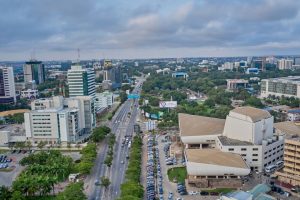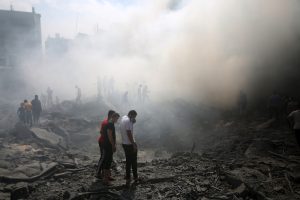
Mansoor Ahmad Malik, Iceland
وَمَن يَهۡدِ ٱللَّهُ فَمَا لَهُۥ مِن مُّضِلٍّۗ
‘And he whom Allah guides – there is none to lead him astray.’ —The Holy Qur’an, 39:38
I have many times thought to myself, ‘I wish I was a convert.’. The idea of having investigated a certain path, had spiritual experiences along that path and ultimately finding the truth and accepting it, despite the flood of opposition and hardships, seemed so special and rewarding.
Yet I have also pondered the possibility of what I would have done if I had not found this path, or not been brave enough to accept it. How unfortunate would I be! Immediately, a surge of gratitude for Allah the Exalted enters my heart for having been born in an Ahmadi household and put on the path of truth from my very childhood. My gratitude increases manifold when I look at my parents, my father in particular, who was and still is the only person in his immediate family to have accepted Ahmadiyyat, the true Islam. So today, I want to mention the untold story of my father’s conversion, one of many heroes to have left everything behind to follow the truth.
My father, Imtiaz Hussain Malik, was born in 1952 and grew up in a small village called Pindori, near Rawalpindi, Pakistan. Ahmadiyyat was initially introduced to his extended family through my father’s paternal uncle, Malik Ghulam Nabi, who introduced Ahmadiyyat to the village in the 1920s. Malik Ghulam Nabi had actually taken my paternal grandfather, Fazal Ilahi, twice to Qadian, India. However, for reasons unknown, he never accepted Ahmadiyyat.
So though there were some family ties to Ahmadiyyat, nobody in his immediate family were Ahmadi, and he knew little about the Community. In fact, even though he was born and raised in a religious family, he was never really inclined towards religion, nor did he strictly adhere to the teachings of Islam, even in offering the five daily prayers.
Introduction to Ahmadiyyat
His own personal introduction to Ahmadiyyat came through two fellow students when he was studying at college. He learnt more about it when he joined the Federal Security Force as he had another two or three Ahmadis training with him.
In relation to that period, my father states, ‘In those days, I used to see a dream very frequently. I would see the countenance of a saintly person, but the picture was rather blurry and I would not be able to make out who this is or what exactly this individual looks like. When I was on leave, I returned to Pindi and asked an elderly family friend of ours, who also used to tutor us when we were younger, as to what this dream could signify. In reply, he told me that I would be fortunate and blessed to see and encounter a very saintly person.’
My father, not knowing what to make of it, moved on and did not dwell on it. Nevertheless, he continued to see this dream rather frequently.
An Unexpected Encounter – The Man in My Dreams
Some time later, whilst on duty, he had to escort an entourage to a place near Pindi, but was not told anything about this entourage. My father says, ‘The following day, we decided to go to Islamabad and visit some of our friends. One of my friends was on duty at that time who was serving in the National Assembly Secretariat. Hence, I went inside and noticed a particular individual seated in the room. When I cast my eyes upon him, the image in my dream came rushing back to me, and I could finally start making out the blurred image I used to see. All the pieces fell in place and all the dots connected. It was this person! This was the first time I saw the blessed countenance and person of [His Holiness] Hazrat Khalifatul-Masih III [Hazrat Mirza Nasir Ahmad (rh), Third Worldwide Head of the Ahmadiyya Muslim Community], but at that time, I had no idea who this was.’
However, my father did not get the opportunity to see His Holiness (rh) again.
The Beginning of a New Journey
In 1978, he was working for State Life Insurance and one day, he had to meet a client who coincidentally lived close to the Community’s mosque, Masjid Nur. As he was leaving, he came across books of the Promised Messiah (as) particularly Our Teaching, which he read again and again. He had heard criticisms on and off from his friends about the Community, but he found nothing objectionable in Our Teaching.
A few days had passed, and not quite sure who to speak to, he returned to the mosque once again, and met the missionary who was stationed there, Imam Inam-ul-Haqq Kausar.
That day, they spoke for a few minutes, and my father mentioned his friends’ criticisms of Ahmadiyyat. But he went on to meet with him every few days for the next few months. ‘At that point, I started to understand and realise that my approach to various matters and my way of thinking was incorrect and that the path to prosperity lay here. My entire family and all of my friends were completely unaware of my engagement with Ahmadiyyat. Only one very close friend of mine knew of this, but I did not fear any opposition or harsh treatment from him. He only advised to make my decision carefully and wisely.’
In the first few days of June, after discussing various matters with the missionary, he handed my father the bai’at form [formal pledge of allegiance]. So he took it home but did not look at it very carefully. At home that evening, ‘I started reading the form as well as the ten conditions of initiation. Nothing seemed against the teachings of Islam or degrading the status of the Holy Prophet (sa). I read them again and a third time and then went to sleep. The time was around 11:30 at night. I suddenly woke up after about an hour, with countless thoughts crossing my mind and was unable to sleep again. I sat down at the table, turned on the lamp and saw the form in front of me. I read it again, but simply did not know what to do, so I tried to sleep again. I fell asleep for about half an hour or so and this cycle of falling asleep for a few minutes and then waking up with all of these thoughts running through my mind continued until around 3:30 in the morning. At that point, I decided to fill out and sign the bai’at form.’
What happened next was strange, considering that my father had not been much inclined at all to say his daily prayers and rarely made time for them. ‘At that particular moment, having signed the bai’at form and having carefully read the ten conditions of initiation, a sudden change was taking place within me and something inside me was telling me to stay up and pray. Hence, I did so and went to sleep afterwards and peacefully slept until ten or eleven o’clock in the morning. It was strange! Just moments [before], I could not sleep and now, I slept peacefully for several hours. Within moments, I went from not praying to offering all of my prayers, each and every day.’
The next day, his maternal uncle visited him and for the very first time, someone in his family learned what he had done. He somehow saw the bai’at form and immediately started raising the same old allegations. But his uncle’s comments had no impact on him, since he had already received satisfactory answers to these questions and allegations, and he responded that this was his decision. My father says, ‘He immediately informed my cousin, whom I was sharing the office with; this was also the place I used to live for the most part; and from there, the news spread further and further within the family and our ties started to deteriorate rather rapidly.’
The Opposition Begins
He went to see the missionary the next day and gave him the bai’at form, but he told him to take some more time to deliberate, since this would not be an easy path. However, my father told him that he was satisfied. ‘After the afternoon prayer, I returned to my office, only to find out that my cousin had changed the lock. Not knowing where to go or where to spend the night, I later decided to go home. Fortunately, I did not have to speak or argue with anyone at that point. The next morning I went to the general office, finished some work and then decided to go to my own office and see what the situation was. My cousin was sitting inside and immediately demanded that I return the motorcycle or pay for it. As I did not have the money at that moment, I had no choice but to return the keys to him. To add to this, he told me that as of today, I was not allowed to come to the office anymore. He told me to come the following morning to pick up some of my things, which I did.’
My father admits that these were difficult days and weeks. He had been expecting this would happen, but not so suddenly. I sensed that he had not told me everything that had happened after his family found out about his conversion to Ahmadiyyat, but my mother filled in the rest of the story: Within a day or two, his entire family turned against him – he was first banned from coming to the office, was then beaten by his uncle, cousin and brother-in-law and kicked out of his family’s home and had no place to stay. He lost his job and when he found another, one of his relatives complained and he was sacked from there as well. His parents in the village sent a message that he should not come and see them again. For the next two-and-a-half years or so, he did not see or speak to his parents or any of his family members. Despite the hardships, he was determined to continue along this path.
A Most Blessed Journey
Towards the beginning of July 1978, the Third Caliph of the Ahmadiyya Muslim Community was scheduled to be in Islamabad for a few days. My father eagerly desired to meet His Holiness (rh) in person. He gave a written request for a mulaqat [private audience] and was told that he would have the honour of meeting His Holiness (rh) in the evening. However, as His Holiness (rh) was not feeling very well, the mulaqat was postponed until the next afternoon and then cancelled altogether as His Holiness (rh) had to return to Rabwah [the Community’s headquarters in Pakistan].
Even though he did not have the blessed opportunity to personally meet His Holiness (rh) that day, Allah the Exalted soon made arrangements for his desire to be fulfilled. Only a few weeks later, he joined a trip to Rabwah, organised by the Community. Regarding this blessed journey, he says, ‘We arrived in Rabwah at night. The following afternoon, Hazrat Mirza Tahir Ahmad (rh) chaired a question and answer session. What a wonderful and extraordinary sitting this was! I had never before heard someone answer questions on any and every topic so profoundly and with such ease and simplicity. It was remarkable! I wanted to say something, perhaps ask a question, but I was afraid I would say something inappropriate. Hence, I quietly listened to the discussion and most of the questions that crossed my mind were answered in one way or another.’
That evening, things took an even more remarkable turn. While he had a group audience scheduled with His Holiness (rh) the next day, my father had a deep desire to meet him personally, just the two of them but the missionary mentioned that due to His Holiness’ (rh) schedule, that might be impossible. ‘Coincidentally, someone working in the Private Secretary’s office was standing next to us and advised us to request for my name to be included among those individuals who would have the most fortunate and blessed opportunity to perform the bai’at at the hands of [His Holiness (rh)] Hazrat Khalifatul Masih III (rh). Alhamdulillah [all praise belongs to Allah], the request was approved and after the ‘Isha [evening] prayer, the bai’at ceremony took place. His Holiness (rh) was sitting right in front of me and my hand was immediately under the blessed hand of His Holiness (rh). What a blessed and fortunate moment this was for me! It is etched into my heart until this very day. Every time I think of it, I can feel that touch and see His Holiness’ (rh) blessed countenance before my eyes.’
Returning to Pindi after this blessed journey, the hardships continued. As mentioned above, he lost his job, his apartment, and his family ties. Many people will wonder: why go through all of this trouble and these hardships? For the sake of the truth and acquiring the pleasure of Allah the Exalted. What an enormous, brave and heroic step he took. I am personally indebted to him and to an even greater extent to Allah the Exalted for having shown him the right path, for if it were not for him, I might not have found this path myself.
All of us have weaknesses and shortcomings, but in terms of his faith in and adherence to Islam and the truth of Ahmadiyyat, I have never seen him stumble. How true is the statement of Allah the Exalted:
وَمَن يَهۡدِ ٱللَّهُ فَمَا لَهُۥ مِن مُّضِلٍّۗ
‘And he whom Allah guides – there is none to lead him astray.’ —The Holy Qur’an, 39:38
About the Author: Mansoor Ahmad Malik graduated from Jamia Ahmadiyya UK (the training seminary for missionaries of the Ahmadiyya Muslim Community) in 2012. He currently serves as both missionary and national president for the Ahmadiyya Muslim Community in Iceland.




Add Comment